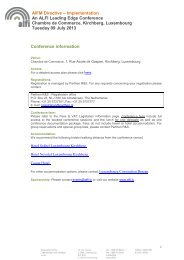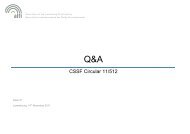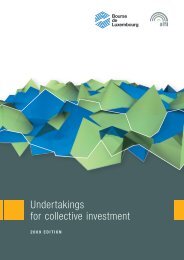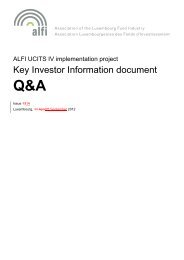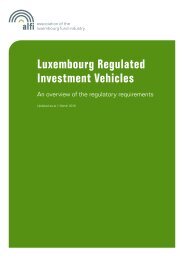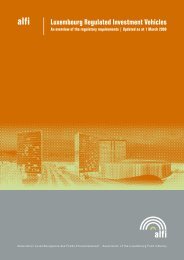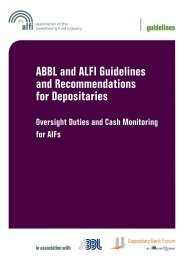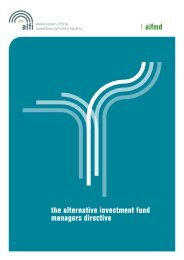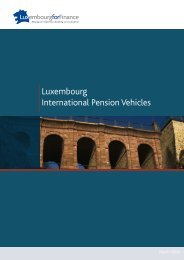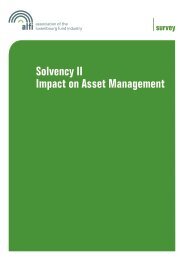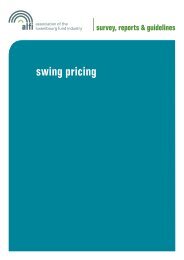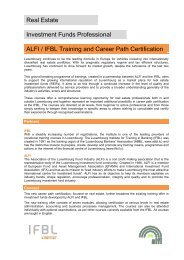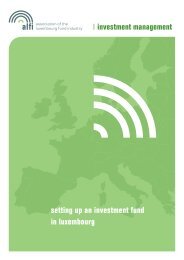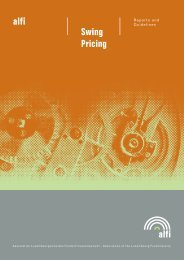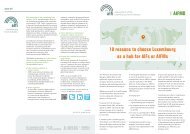Luxembourg: The domicile of choice for financial services - Alfi
Luxembourg: The domicile of choice for financial services - Alfi
Luxembourg: The domicile of choice for financial services - Alfi
Create successful ePaper yourself
Turn your PDF publications into a flip-book with our unique Google optimized e-Paper software.
Immigration<br />
<strong>The</strong> new immigration law that came into<br />
<strong>for</strong>ce in 2008 significantly simplified procedures<br />
with regard to entry, residence and<br />
working requirements <strong>for</strong> non-nationals in<br />
<strong>Luxembourg</strong>.<br />
Entry and residence requirements <strong>for</strong> citizens<br />
<strong>of</strong> the European Union (EU), the European<br />
Economic Area (EEA) and Switzerland (1)<br />
differ from those <strong>for</strong> citizens <strong>of</strong> other countries<br />
(2).<br />
1. Entry and residence requirements <strong>for</strong><br />
EU, EEA and Swiss nationals and their<br />
family members<br />
EU, EEA and Swiss nationals are allowed to<br />
enter and stay in <strong>Luxembourg</strong> <strong>for</strong> a period<br />
<strong>of</strong> up to three months on simple presentation<br />
<strong>of</strong> a national identity card or valid passport.<br />
Any <strong>of</strong> their family members who are not EU<br />
nationals have the right to enter and stay <strong>for</strong><br />
a period <strong>of</strong> up to three months on presentation<br />
<strong>of</strong> a valid passport and visa where required.<br />
EU, EEA and Swiss nationals can stay <strong>for</strong><br />
more than three months if they can show that<br />
they are self-employed or employed, students,<br />
or provide evidence <strong>of</strong> sufficient resources <strong>for</strong><br />
themselves and their family members as well<br />
as <strong>of</strong> adequate health insurance. <strong>The</strong>y must<br />
register at the local town hall within three<br />
months <strong>of</strong> their arrival in <strong>Luxembourg</strong> and are<br />
immediately issued with a document confirming<br />
registration.<br />
Family members <strong>of</strong> EU, EEA and Swiss nationals<br />
who are not EU nationals must apply <strong>for</strong> a<br />
residence card at the local town hall. <strong>The</strong> card<br />
is issued by the Immigration Directorate <strong>of</strong> the<br />
Ministry <strong>of</strong> Foreign Affairs.<br />
EU, EEA and Swiss nationals as well as any <strong>of</strong><br />
their family members who are non-EU nationals<br />
have free access to the labour market.<br />
However, the restrictions provided <strong>for</strong> in the<br />
Accession Treaty mean that nationals <strong>of</strong><br />
Bulgaria and Romania, as well as any family<br />
members who are third-country nationals, still<br />
need to obtain a work permit during the first<br />
year after accessing labour market.<br />
2. Entry and residence requirements <strong>for</strong><br />
non-European nationals<br />
2.1. Entry<br />
Non-EU nationals entering <strong>Luxembourg</strong><br />
must meet the conditions defined in the rules<br />
governing the Schengen Area.<br />
<strong>The</strong> Schengen Area comprises 25 EU Member<br />
States, 1 Switzerland, Norway and Iceland. Ireland<br />
and the United Kingdom are currently the only<br />
EU Member States to have negotiated an opt-out.<br />
<strong>The</strong> Schengen Area operates very much like a<br />
single country <strong>for</strong> international travel purposes,<br />
with border controls <strong>for</strong> people coming<br />
in and out, but no internal border controls.<br />
Non-EU nationals must have a valid passport<br />
and, in some cases, a visa. A complete list <strong>of</strong><br />
the countries whose citizens need a visa may<br />
be found on the website <strong>of</strong> the Ministry <strong>of</strong><br />
Foreign Affairs (www.mae.lu), together with<br />
in<strong>for</strong>mation about required documents.<br />
Non-EU nationals may be refused entry on the<br />
grounds <strong>of</strong> records in the Schengen In<strong>for</strong>mation<br />
System (SIS), if they have previously been<br />
refused entry or if they are a threat to public<br />
security or health. <strong>The</strong>y must show the reasons<br />
<strong>for</strong> their visit and evidence <strong>of</strong> sufficient<br />
resources <strong>for</strong> their stay and return, as well as<br />
<strong>of</strong> adequate health insurance.<br />
<strong>The</strong>se conditions apply regardless <strong>of</strong> the length<br />
<strong>of</strong> their stay.<br />
1<br />
Bulgaria, Cyprus, and Romania have not yet implemented the Schengen Agreement into national law, but are required<br />
to do so.<br />
15



